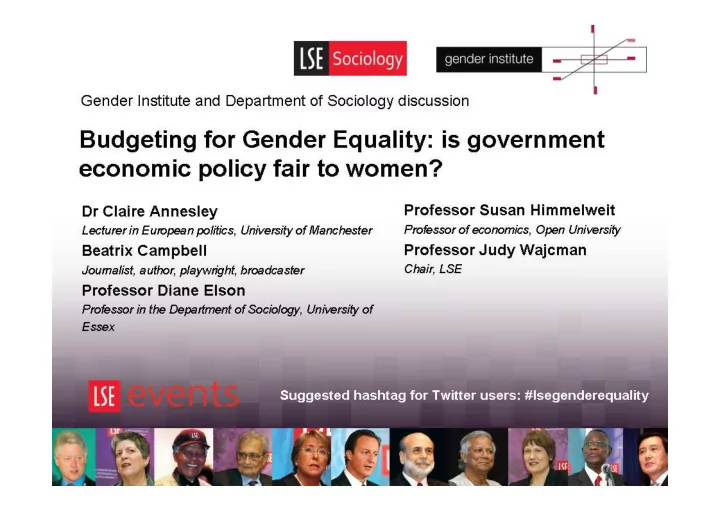

Budgeting for Gender Equality: is government economic policy fair to women? Dr Claire Annesley University of Manchester/Women’s Budget Group claire.annesley@manchester.ac.uk
Foundations for Gender Equality • Equal opportunities for quality paid employment • Access to adequate independent income for all women and men • Coalition’s measures in June 2010 Budget and October 2010 Spending Review chip away at these (see: wbg.org.uk) • Measures and proposals announced so far in 2011 appear to mark a trend towards economic dependence for women and the return of the Male Breadwinner Model. • But there is also potentially some better news.
Welfare Reform Bill (February) • Sets out proposals for Universal Credit: means-tested, single monthly payment to household intended to increase incentives to get one adult into work and to ‘mimic wages’. • Strengthens work incentive for one working adult; but benefit withdrawal rate will be faster for second earners. • Maximum subsidy for childcare costs down from 80 to 70%. • Single household payment. Couples can nominate who the payment should go to; it will only be split in emergencies. • Women manage budgets and day to day spending; a single monthly payment makes it harder to budget on low incomes.
The Budget (March) • Commitments to tax breaks, promoting enterprise and improving skills. But nothing for women’s employment. • Proposed rise of personal allowance to £8,105 in 2012/13 will lift 260,000 people out of tax, 56% of whom are women. • But will not benefit those earning below this threshold, 73% of whom are women (LFS 2009-10). • Desired job growth in the private sector will not necessary benefit women: gender pay gap; less compatible with caring responsibilities; attack on regulations. • Investment in 50,000 new apprenticeships but no commitment to gender equality in allocation or quality. Budget’s emphasis strongly on science.
Pension Green Paper (April) • ‘A State Pension for the 21 st Century’ (2011 DWP) sets out plans for reforming current pensions system. • One option is for single-tier state pension, combining BSP and S2P. Set at ‘around £140’ per week; gets rid of means-tested Pensions Credit. • Explicit aim to reduce gender inequalities in pensions (DWP 2011, 22). • But: future pensioners only; still based on contributory principle (rather than citizenship); does not compensate for loss of public services.
So Far in 2011… • No support for women in the shift from public to private employment opportunities. • An explicit acceptance that the Male Breadwinner Model is ‘justified’ (DWP 2011, 19). • Nothing to help people on the lowest incomes, many of whom are women. • Nothing to compensate lone parents and single pensioners for the loss of services due to October’s public sector spending cuts.
Recommend
More recommend